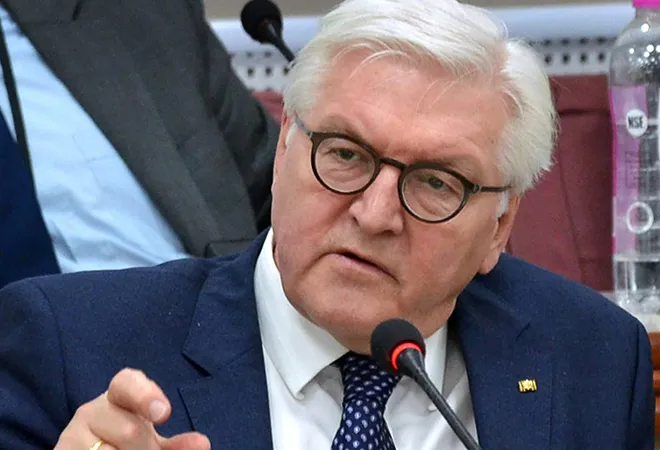
In an era of chest-thumping strongmen, the German President Frank Walter Steinmeier looks a bit fallen out of time. The soft-spoken, bespectacled and down-to-earth doctor of law came to India to encourage Indian students to study in Germany and to promote Indo-German economic cooperation.
If that sounds boring, especially after the sweeping sojourn of the charismatic French President Emmanuel Macron, who aspires to make France a new entry point for India to Europe, it is still worth a closer look. Steinmeier might, in fact be out-of-sync with some new realities, but one has to differentiate between style and substance.
To start with the style. Steinmeier was not welcomed by Indian Prime Minister Narendra Modi at the airport in Delhi, but by the Minister for Drinking Water and Sanitation, S.S. Ahluwalia. Since the unfortunate state visit of Canadian Prime Minister Justin Trudeau, Modi’s missing bear hug at the tarmac has become a not-so-subtle message of alienation from the Prime Minister’s office.
Steinmeier was not welcomed by Indian Prime Minister Narendra Modi at the airport in Delhi.. Since the unfortunate state visit of Canadian Prime Minister Justin Trudeau, Modi’s missing bear hug at the tarmac has become a not-so-subtle message of alienation from the Prime Minister’s office.
Apparently, Steinmeier’s various closed-door meetings with NGOs and religious groups were not appreciated by the Indian government, which should give the German side an opportunity for introspection. There are not many large powers left internationally that are solid democracies and therefore important strategic partners for Europe. This is what Macron has understood and, by the way the European Union and British Prime Minister Theresa May as well.
While Steinmeier rightly stressed the common interest in a rules-based international order and multilateralism in his speech at Delhi University, Germany must find better ways to discuss areas of concern with a long-term friend and partner like India. Especially in a time when ministers of the German government openly declare that “Islam is not part of Germany” and statistics tell us that Germany saw 950 violent attacks on mosques and Muslims in 2017 alone.
So much for the style. Unfortunately, and that is bad news for Germany, style might matter most at the moment because the rest of the Indo-German partnership is more or less on autopilot. Germany is and remains India’s largest trading partner in Europe and it has done well in attracting students in the last few years. With an average of 15.000 Indian students annually, it comes third globally, just behind American and British universities – despite the language barrier.
So much for the style. Unfortunately, and that is bad news for Germany, style might matter most at the moment because the rest of the Indo-German partnership is more or less on autopilot.
While France (and Israel) might (or might not) replace Russia as India’s largest arms-supplier(s), this has never been an aim of Berlin. Although Germany has a substantial weapons industry, it is politically highly unpopular to support it — and it will remain so in the future. Nonetheless, Germany is the 7th largest foreign direct investor in India and German industry will keep on demanding more reforms from the Indian government while doing good business here.
This leaves the question of what else could define the strategic partnership in the 21st century. Obviously, a rule-based global order and the future of liberal democracy are important issues for Europe, as are international terrorism, security in the Indian Ocean area and the ascent of China. While Germany might not be the most important player in many of these fields, it is still an important player with a vital interest in all of the above.
Deepening an existing partnership is therefore the need of the hour. This requires a fresh look once-in-a-while at changed realities at home and in the world and to act accordingly. Frank Walter Steinmeier emphasized in his speech at Delhi University that each visit to India gives him a new opportunity to learn. There is a lot to take home for the German President this time around.
The views expressed above belong to the author(s). ORF research and analyses now available on Telegram! Click here to access our curated content — blogs, longforms and interviews.




 PREV
PREV


